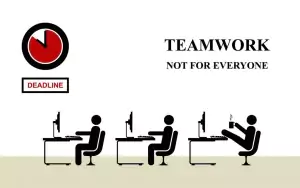 The world of developed capitalism in which we live in nowadays requires the constant increase of productivity. Productivity is what billions of guides, books, and training sessions are dedicated to; in order to increase it, companies regularly come up with new strategies, models of workflow organization, and so on. One of the sacred cows of modern capitalism is teamwork; for some reason, managers of all ranks believe teamwork is the ultimate component of success (or at least one of them). Team-building activities, corporate parties, group projects, hanging out with colleagues after work, and so on—all this is meant to organize productive teamwork. But, is teamwork really all that superb?
The world of developed capitalism in which we live in nowadays requires the constant increase of productivity. Productivity is what billions of guides, books, and training sessions are dedicated to; in order to increase it, companies regularly come up with new strategies, models of workflow organization, and so on. One of the sacred cows of modern capitalism is teamwork; for some reason, managers of all ranks believe teamwork is the ultimate component of success (or at least one of them). Team-building activities, corporate parties, group projects, hanging out with colleagues after work, and so on—all this is meant to organize productive teamwork. But, is teamwork really all that superb?

✅ AI Essay Writer ✅ AI Detector ✅ Plagchecker ✅ Paraphraser
✅ Summarizer ✅ Citation Generator
Usually, people write something like this in their CVs: “Enjoy working in a team,” or “Work best in a team.” However, working in a team often means devaluing the work done. For example, if you are a lone wolf who has just accomplished a complicated project, you get all the credit, your reputation grows faster, and you get paid more. On the other hand, in a team, the credit cannot be given to someone specific; instead, a team manager usually gathers everyone in a conference room and says something like, “Good job, everyone.” This might be satisfying if you have a strong self-identification with your team, but usually this is not enough. This may lead to a decrease of personal interest and motivation in the work done. Do you want all the credit for the work done to be shared among a number of people (Silverton Internet College)?
Working in a team does not mean that all the working processes will consist of super-productive meetings, intense brainstorming, and the accurately-organized work of professionals, where everyone knows their part of the job perfectly. Usually, the efficiency of teamwork is decreased by a number of factors. Among the factors one could include are team members’ unwillingness to take responsibility, procrastination of team members, noisy surroundings, personal conflicts between team members, poor organization of progress of work, gossiping and informal communication, and so on. At the same time, when working individually, it is easier to focus on a task, without getting distracted by random chattering. Besides, individual work implies higher personal responsibility for outcomes (FRI).
Another important factor is the people’s temperament within a team. Working in a team, interacting with other people, sharing responsibilities, and spending a lot of time with coworkers is good for extroverted people. Extroverts are not necessarily always uninhibited, friendly, and communicative, but they indeed work better in groups. Since extroverted people make a majority of Earth’s population, there is no surprise that corporate culture is oriented towards them. However, introverted people are also numerous; they prefer to control the amount of their daily social interactions, to work alone, to determine the volumes of work for themselves, and think about current work issues alone. For them, teamwork is usually a curse; commonly, introverts do their share of work, and leave all the bright ideas they have for themselves. Introverts usually do not enjoy working in teams, and a professional manager should know that they disclose their full potential only when allowed to work on their own (IFR). Therefore, a team that does not take into account the needs and qualities of introverts in it is less productive than it could be.
Teamwork is important for modern companies, as it is considered to be an effective form of workflow organization. At the same time, a teamwork’s efficiency is often overestimated, due to numerous factors. Among them one should mention the lack of personal interest and motivation in doing the job; poor organization and a large number of distractions; besides, some people are not suitable for teamwork, and disclose their full potential only when working alone. Therefore, the role and efficiency of teamwork should be reevaluated.
References
Sparkson, Jeremy. “Myths about Teamwork.” IRF.net. N.p., 01 June 2012. Web. 07 May 2015.
“Why a Team of Introverts is a Bad Idea.” FRIHealth. N.p., n.d. Web. 07 Apr. 2015.
“Motivation in Team.” Silverton Internet College. N.p., n.d. Web. 07 May 2015.
Follow us on Reddit for more insights and updates.





Comments (0)
Welcome to A*Help comments!
We’re all about debate and discussion at A*Help.
We value the diverse opinions of users, so you may find points of view that you don’t agree with. And that’s cool. However, there are certain things we’re not OK with: attempts to manipulate our data in any way, for example, or the posting of discriminative, offensive, hateful, or disparaging material.